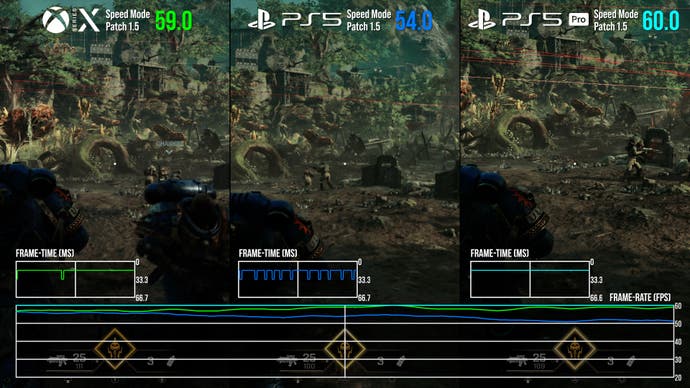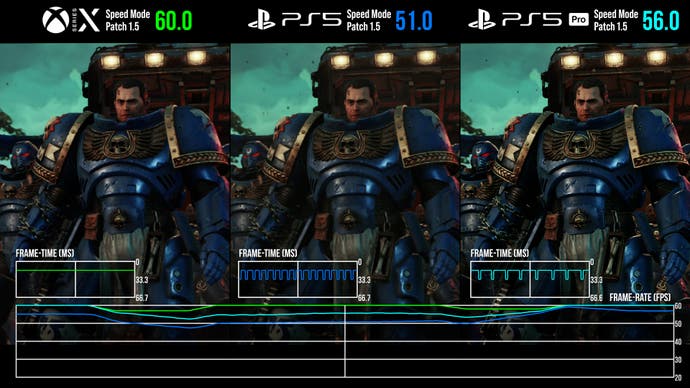PlayStation 5 Pro support at last arrives for Warhammer 40K Space Marine 2, resulting in one of the more worthwhile upgrades we’ve seen on Sony’s mid-gen console to date. As of patch 1.5, PS5 Pro boosts performance in its 60fps speed mode and addresses the (at times) blurry image quality in that very same mode. Speed and quality modes both use PSSR in place of the original FSR2 method to improve image quality, while also pushing the internal resolution on each mode higher and targeting a 4K output resolution. In brief: on quality mode we now get a 1080p to 4K range as the input resolution, while on speed mode that range adjusts to 1080p-1440p.
The big question then is whether the transition to PSSR is enough to make a perceptible difference to clarity on each mode. Especially in motion, what’s the advantage versus the base PS5? And looking at the 60fps speed mode in particular, does the PS5 Pro finally deliver the smooth experience that was off the table for the base PS5?
Before we kick off, a quick word on the state of the game on base PS5 today. The fact of the matter is that the 30fps quality mode always ran pretty well on base hardware, but the speed mode struggled with a wavering 35-60fps frame-rate readout. Comparing patch 1.2 – the version we tested in the original review three months ago – to today’s patch 1.5, there’s a respectable difference. The good news is we’re seeing a 5-10fps improvement on base PS5, and occasionally even higher. Due to the variable nature of combat it’s a real challenge to sync up gameplay on each, but the comparison still paints a clear picture overall: Saber Interactive has worked hard since launch to squeeze PS5 for better performance.
The net result is, those with a VRR-supporting display will benefit from the new patch, though the frame-rate can still slip below the 48fps cut-off for VRR on PS5 at times. Also, there’s no real improvement in the game’s self-evidently CPU-bottlenecked areas. The battle with the ripper swam at the end of mission two, for example, still hovers at around the 40fps mark, and even dips into the 30s at times. Finally, despite the general uptick in performance elsewhere, base PS5 does not match up to Xbox Series X’s performance level in the speed mode, which we re-tested in patch 1.5 as well. The opening cutscene has PS5 fall short by up to 10fps, though in gameplay itself that margin narrows considerably. Series X is still the console to beat when it comes to hitting 60fps.
Starting our PS5 Pro testing then, the 60fps speed is the obvious starting point with plenty to gain from the new hardware and PSSR. Space Marine 2’s use of PSSR is a success on a similar level to Final Fantasy 7 Rebirth, allowing this 60fps mode to look much cleaner and clearer. In terms of raw resolution metrics, it’s boosted from 720p to 1080p with FSR2 on base PS5 to 1080p-1440p reconstructed to 4K with PSSR. Despite the core visual settings remaining unchanged, the higher resolution and machine learning upscaling produce a huge improvement to the image in motion.
Even in static shots, where an accumulation of frames helps both sides to resolve a 4K image, PS5 Pro ends up with a crisper picture. The base PS5 holds up reasonably well while held still, but PS5 Pro still manages to resolve distant plant detail more accurately. The greater Pro advantage though is in actual motion: PSSR’s handling of dense jungle areas in mission one is truly standout, replacing the often mushy, blurred resolve of FSR2 with a crisper outline to each bit of scenery. PS5 Pro’s ability to both generate more pixels – 1080p minimum, compared to a nadir of 720p on on base console – and to upscale it more intelligently allows for a huge improvement. From the grass, mud and mulch on the floor to the detailing on reflections and the metallic grates of a battle barge, all elements benefit from the move to PSSR.
It’s not perfect however. The downside is that the image is over-sharpened in spots, notably the foliage, and also the reflected elements in puddles. Elements with lots of sub-pixel movement, like swaying grass blades, at times still produce noise – aliasing. In a similar vein, you’ll still spot flicker on hard, high-contrast surfaces too. There is a trade-off, but overall, it’s still a net positive for PS5 Pro in this mode.
Looking at the speed mode’s actual performance next, PS5 Pro nudges the reading even closer to the target 60fps. This isn’t an absolute lock at that top number by any means, especially once engaged in battle with multiple tyranids, but it is a boost in most respects over the base PS5 reading. In comparing the two machines, both updated to patch 1.5, we’re looking at up to a 5fps gain during the opening cutscene as we land on the battlefield. From here onwards, the delta widens further to show a 10fps advantage on PS5 Pro in battle. At times it’s even higher, though gameplay becomes increasingly tricky to sync up exactly. Alas, it’s also hard to ignore the lingering drops on Pro: we’re still seeing lurches to 45fps, just as enemies emerge from their pods on the opening jungle planet. Also, while improved, we’re still generally operating in the 50-60fps range during set-pieces involving swarms of enemies. In short, all of this puts PS5 Pro more often at 60fps than base PS5, and ensures that the frame-rate remains within the 48-60 VRR window more often – but it’s not a lock.
There’s one further caveat to speak on. It’s an exceptional moment, but the handling of the infamous ripper swarm set piece in mission two still struggles on PS5 Pro. Unfortunately, Space Marine 2 puts demands on PS5 Pro here that are not solved by a 45 percent boost in GPU power, nor the offering of PSSR as an upscaler. In facing a huge swarm of enemies – similar to the rats in A Plague Tale: Requiem – PS5 Pro only ekes out a small performance gain over base PS5. The frame-rate oscillates between 40-60fps, which is an improvement on the dips below 40 we had before, but it’s not enough. This is far from an optimal 60fps experience, and perhaps highlights the limits of the similar CPU profiles of each console.
A frame-rate comparison to Series X also shows mixed fortunes. With each console updated to patch 1.5, Series X still has a 5fps advantage over PS5 Pro during the opening cutscene, though the result tends to favour PS5 Pro as we make the same run into the battlefield. Overall, the speed mode clearly benefits from Sony’s new hardware: it’s smoother in its overall frame-rate, and with a sharper image to boot, but it does have a few rough spots still to address.


Switching over to the 30fps quality mode, the image quality gains are less profound on PS5 Pro, but still evident in side-by-side shots. Frankly, the FSR2 upscale on base PS5 already produces a crisp, clear image here, in rendering a dynamic 1080p to 1440p range that provides plenty of pixel data to work with. By contrast, PS5 Pro’s push to a dynamic 1080p to 4K range with PSSR is a great but less essential upgrade.
Looking at the quality mode’s frame-rate, it’s business as usual on Pro hardware. We get a locked 30fps read-out regardless of the situation, just as with base PS5. Impressively this includes the taxing ripper swarm segment, which has enough of a performance overhead – at 40fps lowest in the speed mode – to hold steady with a 30fps cap in place. Overall, the offering of a 30fps quality option makes sense on PS5 Pro, for two reasons. Firstly it gives us a water tight 30fps lock, just as with the base PS5 console, meaning those not happy with the frame-rate drops in the speed mode have a backup option. And secondly, by having a 33.3ms render budget per frame, quality mode has the scope to push a higher resolution frame on average, within its higher dynamic resolution range. The result is greater temporal stability: less shimmer on grassy elements and less flicker on metallic meshes of the battle barge than the speed mode.
All round, Warhammer 40K: Space Marine 2 looks and runs better on PS5 Pro, with developer Saber Interactive’s use of PSSR paying off in a more handsome-looking game. In practise it’s the image quality upgrade in the 60fps speed mode that stands out most with a cleaner resolve and higher frame-rates, even if a locked 60fps is still off the table. The advantage will be most keenly felt among VRR display owners who now have more frames to work with on average, though the drops to 40fps are still an issue. In theory, a 40fps capped option would have been perfect for Pro owners running on 120Hz displays in this case, given that the game capably runs above that line. Instead, what we have on patch 1.5 is still a solid upgrade on 60Hz displays, and even for base PS5 owners, it’s good to see Saber continuing to optimise performance over the launch build.





